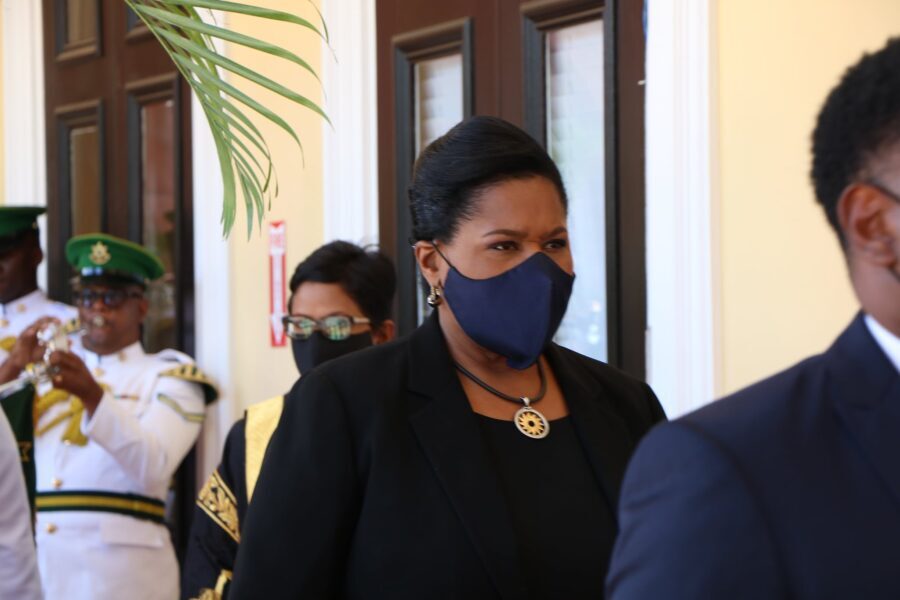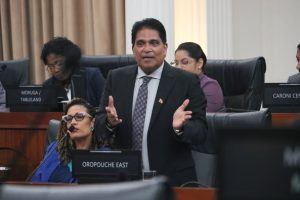By Sue-Ann Wayow
VIOLENCE against women continues on a rampage and one in three women continue to experience intimate partner violence in Trinidad and Tobago, a statistic that is also reflected at the global level.
This was stated by President Paula-Mae Weekes on the occasion of the International Day for the Elimination of Violence Against Women on Thursday.
The elimination of violence against women depended upon the cooperation of every sector of society, Weekes said.
“No longer can we hide behind the old colloquial saying ‘stay out of man and woman business,’” she said.

In her message, President Weekes said, “Although we in Trinidad and Tobago have been having conversations about violence against women in our society for decades, a cursory glance at some of the headlines over the past few weeks would reveal that violence against women continues unabated.”
These women she said included daughters, sisters, mothers, friends, beloved relatives and most significantly human beings who have had their lives cruelly snuffed out at the hands of people who according to one grieving family member, could not walk away.

There were also those who fall victim to strangers or casual acquaintances.
The President asked, “When will enough prove to be enough? How many more families must be deprived of their loved ones? How many more women must lose their lives, health, happiness and dignity to insecure, dysfunctional and predatory individuals before we at all levels of society adopt a zero-tolerance policy where we acknowledge that it’s not ‘cute’ when boys harass girls at school and there are mechanisms put in place to report and deal with the offenders, where neighbours take their suspicions to the police, where workplaces take sexual harassment seriously and co-workers rally around their colleagues who may exhibit signs of abuse, where prompt and empathetic police investigation is the norm and the Courts provide justice for victims?”
President Weekes reminded the population that last year, Trinidad and Tobago witnessed an inspiring wave of activism and advocacy against violence against women following the gruesome deaths of two young women.
“All quarters of society joined hands to demand better for our women and our country. That tide should not ebb now, especially given the uptick of domestic violence cases which, according to international and local reports, has been driven by the stresses and strains brought on by the Covid-19 pandemic,” she said.
Recommendations
Support groups for victims should be well-resourced and funded and the police, who President Weekes acknowledged have made laudable strides in their approaches to dealing with gender-based violence (GBV) must continue to be trained and evaluated.
Survivors have to be supported and protected, the eyes and ears of the public alert and citizens unafraid to report suspected cases of abuse, President Weekes said.
The role of men
She added that men, the main perpetrators of GBV, must acknowledge their role in perpetuating abuse, challenge negative stereotypes which normalise aggression and violence in men and boys, and take action to correct harmful attitudes and behaviours towards women.
“There can be no solution to GBV without the active participation of men,” President Weekes said.
She recommends that age-appropriate conversations start as early as a primary school where boys can be taught how to deal with rejection and their emotions, understand the concept of consent, and learn that GBV refers not only to physical abuse, but also sexual, emotional and financial exploitation as even where men do not physically harm women, they may be perpetrators of more subtle forms.
She encouraged men to take the opportunity to reflect and ask themselves some pertinent questions.
These include:
- Do I try to control my partner’s finances?
- Do I constantly belittle, degrade or humiliate them?
- Do I isolate my partner from her family?
- Do I make sexually suggestive remarks or unwanted advances to my friends or colleagues?
- If yes, then what am I prepared to do about it?
Weekes said, “Self-awareness and seeking the necessary help are key to dealing with and ultimately ending violence against women.”
Perpetrators and victims of GBV can seek and receive counselling from the National Family Services Division of the Ministry of Social Development and Family Services, accessible at 623-2608 Ext 6701-7.
![]()













